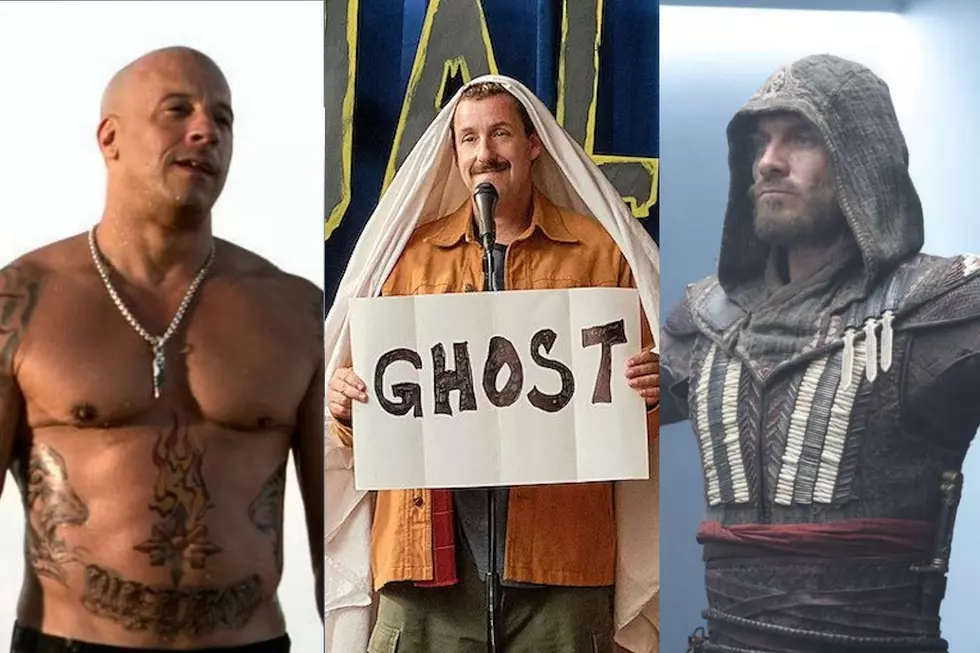
In 2014, Reality TV Honored a Cancer Battle Beautifully; In 2015, it Spat in Survivors’ Faces
It was nearly one year ago that MTV Challenge competitor Diem Brown, who'd been fighting cancer for a decade and over the course of three separate diagnoses, desperately tweeted the message below:
Three days later, she was gone.
In the weeks that preceded her death, Brown, a promising athlete who'd devoted her life to advocating for cancer survivors and the newly diagnosed, slowly deteriorated. Her legs, once the quickest on MTV's competition show, devolved into ornaments sized exclusively for wheelchairs and gurneys. Doctors hammered stents into her kidneys to relieve pain issued by aggressive tumors—which had spread from her ovaries into her stomach, liver and lymph nodes—and outfitted her with a colostomy bag when malignancies began to obstruct her intestines. She lost her appetite, and ate Cheetos crumbs or pizza crust only when relentless gut pain occasionally subsided. At night, she clawed at her hospital bed's side rails while writhing in pain.
When Brown died, I was an in-house TV reporter and writer at MTV News, and her story was one I'd been covering closely. I got the job in 2011, but had already been watching the Challenge series for years, and upon Brown's first appearance in 2006, I remember how steadfastly she competed, even though her first round of chemotherapy loomed. She told only a single fellow cast member during filming that she was sick, and admitted "I want to be able to do everything physical now, because I'm not sure when I'm gonna be able to do anything physical again." She missed out on The Challenge: Fresh Meat's final prize money by a whisker.
But after successful treatment and a remission green-light, she demonstrated just how physical she could be—pills, potions and poisons considered. Across the ensuing nine years, and between show sets that landed on Iceland, Thailand and the beaches of Brazil, audiences watched Brown fight her way to a handful of games' ends, stunned by her will and resolve. She most memorably won a game called "Ring Toss" in 2007's Real World/Road Rules Challenge: The Duel after removing a bandanna and revealing—for the first time—inch-long hair that had been thinned by radiation.
"I was told I wasn’t gonna see the next year, but you realize very quickly that if you don’t let things crush you, you become stronger," Brown reflected on 2013's The Challenge: Rivals II, filmed six years, a few games and a second wave of tumors later. I'd never met or interviewed someone as relentlessly optimistic as she.
Eventually, she proved she could outlast the Challenge's most menacing villains. Cancer, on the other hand, stubbornly ignored the rules of the game and insisted on playing dirty. Finally, on last summer's The Challenge: Exes II, the show's emblem of hope collapsed, and production flew her home to New York City. She'd fought through hell and to the top of glaciers and mountains, but a third round of combat finally stripped the soldier her of her arms. There was no more fighting.
"I’m realizing that no matter how organized your ducks are, life can change in two seconds, so you can’t keep on waiting." Brown's voice narrated shaky and uncomfortable camera shots that captured crew members rolling her stretcher up to a small plane's entry hatch. "If you keep on waiting, it’s gone."
I remember her funeral delivering a sense of optimism, somehow. Her friends and family handed out neon ribbon-pins that cut through dark wool and grey suits like streetlights. Trisha Yearwood sang. Katie Couric, who'd bonded with Brown through Stand Up To Cancer efforts, left lovely sentiments with speaker Ethan Zohn. And though Manhattan's Church of St. Francis Xavier could only hold so many, a concurrent We <3 Diem special on MTV gave non-local fans a final chance to say goodbye, too.
I could rattle on about what I think MTV has done wrong in recent years (its recent wave of departing executives likely serves as additional evidence), but its treatment of Brown in her final days was very, very right: thorough but prudent, hopeful but conclusive. It was gritty and painful and beautiful.
And yet, within a matter of months, "cancer" in the context of reality television regressed into fodder served between canapes at astrology-themed cocktail parties.
I don't routinely watch Real Housewives of Orange County, and my running Bravo knowledge extends about as far as Top Chef's kitchens. But when I heard there was a possibility that someone faked cancer on the most recent tenth season, which premiered in June, I dubiously tuned in.
I probably shouldn't have.
About halfway through the most recent string of episodes, which wrapped up in October, the cancer prognosis for a man named Brooks Ayers came into question. Ayers, who was dating cast member Vicki Gunvalson, was understood to be undergoing treatment for non-Hodgkin's Lymphoma, but suspicions began to manifest when he shrugged off advice offered by the show's other players—some of whom had relationships with oncologists or were doctors or nurses, themselves. And Ayers' actions did little to quell doubt—he habitually dodged conversations that addressed his course of care, and once proudly declared he'd gone off chemotherapy for an experimental treatment that was ultimately debunked as a glorified juice cleanse. Later, the medical center at which he claimed to have received PET and CT scans insisted it hadn't performed either in years, and the hospital reports he produced as proof of his medication were lousy with errors and oversights no competent professional would have released.
Instead of dismissing the witless mania of a clearly troubled man who had already been accused of lying about cancer a handful of times in years past, the show's stars predictably fanned the flames, capitalizing on what they quickly realized was potentially entertaining hysteria. The cast members consulted a psychic for insight and sipped on sparkling sake while obtusely comparing facts and figures like Grey's Anatomy extras studying a fresh set of sides. The series had Ayers right where they wanted him, and his story's ambiguity paired with potential for argument was like a series of routine ground balls hit to a seasoned infield that was intent on landing another wave of Gold Gloves.
Bravo had a choice to make: It could have recognized that—whether Ayers was sick or well—what he brought to the show was pollution, and too offensive to endorse. Executives could have conceded that while the landscape of reality TV has been reduced to bloody brawls and mindless, derisive argument, some things are simply verboten when not addressed justly, or with compassion. Instead, the network compounded the story's absurdity. For weeks, the channel broadcast strained, vapid supposition and squabbles between the show's cast about terminal illness (or fake terminal illness) while skirting the horror of its reality. It was an act of total complicity in a narcissist's delusions, and one that failed to inform beyond rumors or empathize even slightly with sufferers. How was Pilates? Are we still on for drinks Tuesday? Can you believe Brooks?
By the show's finale, cancer had become as conversationally ubiquitous and inconsequential to the Housewives world as discussion of at-home colonics or construction of million-dollar chateaus with coastal views. Cancer had become, simultaneously, grossly exploited and coldly dismissed. It had become a ratings-baiting, champagne-soaked punchline that deservedly made villains out of otherwise unremarkable women. Whether they believed in Ayers' ailment or doubted the sincerity of his condition, they peddled a just-for-fun gag that wasn't subject to needles, grief or the selection of a suitable headstone. If it was cancer, it was cancer-lite; cancer: the fantasy.
And for what, exactly? The complete truth may not come, but Bravo is nevertheless intent on suspending the uncertainty of Ayers' fate as if conclusive evidence he's truly sick could only ever function as a means to settle a debate. But the jury's happy to remain hung, and Ayers, who still hasn't shown a shred of physical strain, earned an exclusive interview with Andy Cohen that will air as a standalone special called Brooks Tells All this week. Cohen smiled and giggled as he introduced a preview clip on Watch What Happens Live in which Ayers blames missing a consultation with a renowned oncologist on two tandem flat tires.
(For the record, Leann Edmonds Horton, a peripheral member of the O.C. ensemble, died of cancer shortly after the season stopped filming. She seemed kind and gracious but casual viewers would probably be none the wiser: She was mostly ignored in hindsight on the show's three-part reunion special.)
So long as hurling wine into a stranger's face stands as the gold standard of reality TV currency, reds, whites and roses will remain airborne. But it's not naive to hope that even the most repugnant sideshow acts can be held to certain standards, and where cancer—a life-altering, earth-shattering succubus—is concerned, there is no wiggle room: it should be addressed with integrity, or cameras should remain fixed, instead, on dining room-clearing screaming matches. Not all Housewives fights are created equal, and here, moral relativism is a losing game.
This week (November 10), MTV released an Honoring Diem update online in which Diem's sister, Megan, shares her experience canvassing for a congressional ovarian cancer caucus. Watch it above.
Brooks Tells All airs Thursday (November 12) at 9 PM EST on Bravo. Make conflicting plans.
Look back at celebs we've lost recently:
More From PopCrush









